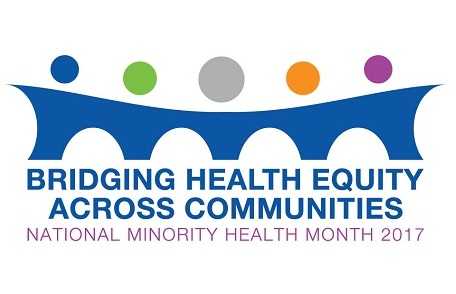Celebrate National Minority Health Month!
 April is National Minority Health Month. The theme for 2017 is “Bridging Health Equity Across Communities.” Learn what CDC is doing and help raise awareness of the health disparities that affect minorities.
April is National Minority Health Month. The theme for 2017 is “Bridging Health Equity Across Communities.” Learn what CDC is doing and help raise awareness of the health disparities that affect minorities.
“Without health and long life, all else fails.”
– Dr. Booker T. Washington
Recognizing that health is the key to progress and equity in all other things, Dr. Booker T. Washington proposed the observance of “National Negro Health Week” in April 1915. He called on local health departments, schools, churches, businesses, professional associations, and the most influential organizations in the African-American community to “pull together” and “unite… in one great National Health Movement.” That observance grew into what is today a month-long initiative to advance health equity across the country on behalf of all racial and ethnic minorities – National Minority Health Month.
Minority Health
CDC’s Office of Minority Health and Health Equity’s mission is to advance health equity and women’s health issues across the nation through CDC’s science and programs, and increase CDC’s capacity to leverage its diverse workforce and engage stakeholders toward this end.
What is Health Equity?
Health equity is when everyone has the opportunity to be as healthy as possible.
What Are Health Disparities?
Health disparities are differences in health outcomes and their causes among groups of people. For example, African American children are more likely to die from asthma compared to non-Hispanic White children. Reducing health disparities creates better health for all Americans.
Why is Health Equity Important?
Health is central to human happiness and well-being and is affected by where people live, learn, work, and play. According to the World Health Organization , health also makes an important contribution to economic progress.
Heckler Report
After years of observing poorer health for Blacks and other minorities in comparison to Whites, the Secretary of Health and Human Services, Margaret Heckler, commissioned a powerful task force in 1984 to describe these health results more fully and to consider what the federal government could do to address them. The Secretary released the Report of the Secretary’s Task Force on Black and Minority Health in 1985, known as the Heckler Report. The Heckler Report documented the extent of health disparities affecting Americans of color and recommending action steps for the nation to address these disparities. This was the first time the federal government provided a national picture of the health of racial and ethnic minorities. Since the publication of the Heckler Report, we are better able to describe more fully the health of all Americans.
Hispanic Health Vital Signs
This first national study on Hispanic health risks and leading causes of death in the United States by CDC shows that Hispanics had higher death rates than Non-Hispanic whites from diabetes and chronic liver disease and cirrhosis (scarring of the liver). The report encourages the use of community health workers, also called promotores de salud , to provide resources to educate the Hispanic community about health risks and preventive services.
Upcoming Minority Health Events
Public Health Ethics Forum
The 2017 Public Health Ethics Forum, “Optimal Health for Her Whole Life,” focuses on a range of health issues and actions to improve the health of women and girls in the United States. The National Center for Bioethics in Research and Health Care at Tuskegee University and CDC’s Office of Minority Health and Health Equity host this annual event. This year’s forum explores ways to promote and protect women’s health across the lifespan by emphasizing public health ethics in the practice of public health. A public health ethics lens ensures a uniquely expanded focus on population health opportunities and challenges. Stay tuned to the Public Health Ethics Forum webpage for more information.
More Information
- CDC Office of Minority Health & Health Equity (OMHHE)
- CDC Health Disparities& Inequalities Report (CHDIR)
- Critical Examination of Factors Related to the Smoking Trajectory among African American Youth and Young Adults
- Disability & Health
- Farmworker Health
- Health Disparities in Cancer
- Healthy People 2020: Social Determinants of Health Topic Area
- Social Determinants of Health (SDH) Resources
- Strategies for Reducing Health Disparities
- Tobacco-Related Disparities
- Tribal Support
- Women’s Health
- Page last reviewed: April 3, 2017
- Page last updated: April 3, 2017
- Content source:
- Office of Minority Health & Health Equity (OMHHE)
- Page maintained by: Office of the Associate Director for Communication, Digital Media Branch, Division of Public Affairs




 ShareCompartir
ShareCompartir